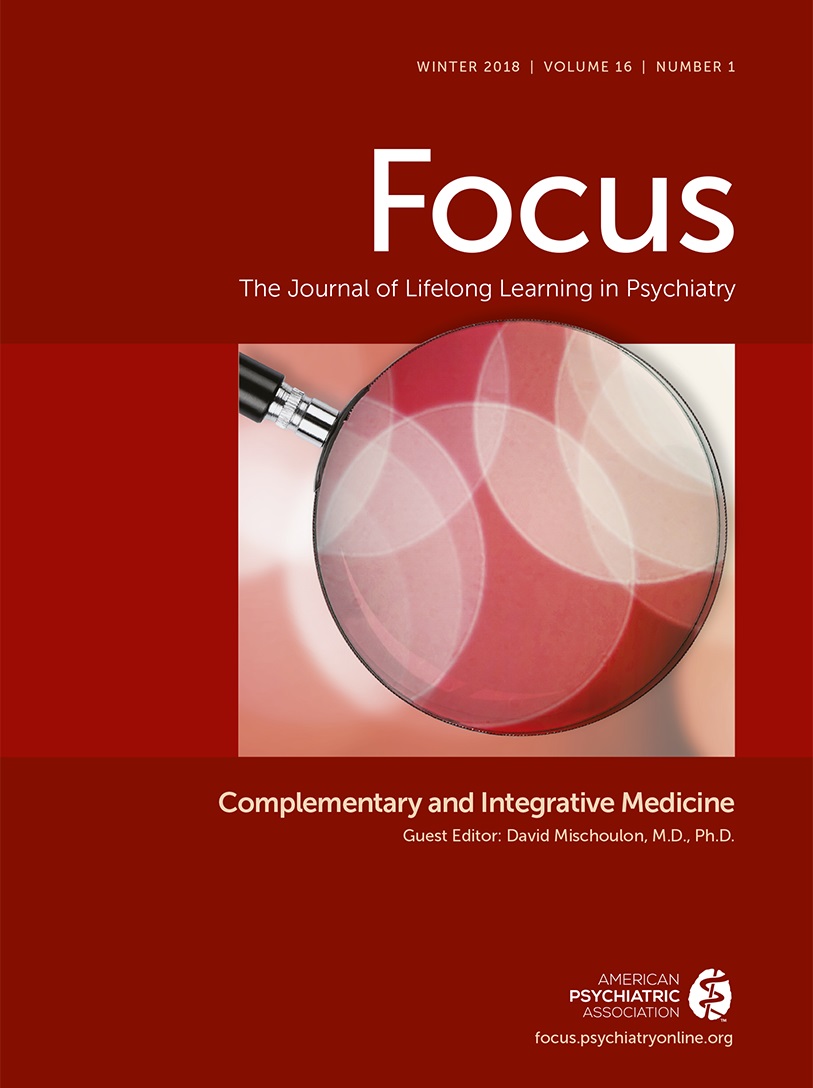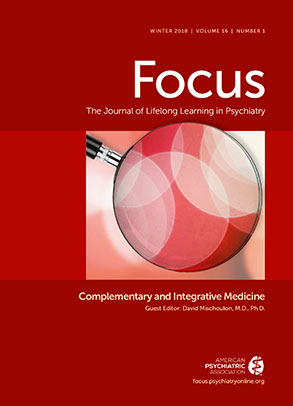For a patient who is using complementary and integrative medicine treatments, what is the role of the psychiatrist in maintaining patient safety and optimizing the patient’s response to treatment?
In the United States, the popularity of complementary and integrative medicine approaches is rapidly increasing among patients with physical and mental disorders, especially in aging “baby boomers” (those born between 1946 and 1964) and the birth cohorts that follow them (
1). According to the National Center for Complementary and Integrative Health (NCCIH), “complementary” is defined as unconventional therapies added to mainstream medicine, whereas “integrative” is defined as the coordinated use of complementary and conventional approaches for the management of specific symptoms. The NCCIH categorizes complementary approaches into three categories: natural products (e.g., vitamins, probiotics, and herb supplements), mind and body (e.g., yoga and meditation), and whole-systems approaches (e.g., Ayurvedic medicine, traditional healers, or traditional Chinese medicine) (
2).
According to the 2012 National Health Interview Survey (NHIS), natural products were the most commonly used complementary approach at 17.7% (
3). Additionally, according to the NHIS, 9.5% of adults in the United States, or 21 million people, practice yoga, and that number increased from 5.1% in 2002 and from 6.1% in 2007 (
3). Furthermore, with the increasing number of older adults in the U.S. population, the number of individuals who are practicing complementary approaches to treat chronic illness and promote well-being is anticipated to increase as well (
1). Groden et al. (
4) revealed that the baby-boom generation was more likely to use complementary and integrative medicine (CIM) approaches than were the pre–baby boom generation (those born in 1945 or earlier).
The spiking interest in integrative medicine stems partially from the limited successes of Western medicine to manage chronic mental and physical disorders and chronic pain. For example, depression tends to have a chronic relapsing course with partial response rate to traditional antidepressant treatment of about 47%, and the remission rate is even lower at 28% (
5). At the same time, a systematic review for use of St. John’s Wort (SJW) in depression suggests similar efficacy to that of standard antidepressants (
6) and better tolerability than for traditional antidepressants (
7). In addition, certain natural supplements such as rhodiola rosea fall into a category of adaptogens, which assist individuals in tolerating stress and restore homeostasis, allowing individuals to adapt to the environment (
8). Neurodegenerative diseases such as Alzheimer’s disease and vascular cognitive impairment are irreversible diseases that cause significant morbidity and mortality, and there are no cures. In the case of neurogenerative diseases, complementary approaches may provide effective treatments. A recent randomized controlled trial demonstrated improvements in mild cognitive impairment with yoga (
9). Because of the limitations of traditional “mainstream” medical treatments and the growing evidence for the efficacy of complementary approaches (
10,
11), and the patients’ increasing use of integrative approaches, we recommend utilizing an integrative approach to promoting well-being.
Because natural supplements are not regulated by the U.S. Food and Drug Administration with the same stringency as are conventional medications, misinformation on the Internet and among consumers and variability in product purity are prevalent. It is the physician’s responsibility to fully understand the uses of the natural products and other CIM practices and appropriately inform patients of the risks and benefits. Often patients will combine traditional medicines with alternative treatments without disclosing such information to medical providers, which could affect the response of and influence tolerability and herb-drug interaction with prescribed treatments. It is essential that physicians inquire about the use of natural products and discuss the use of such products for patient safety.
Below we illustrate this discussion with the clinical case of an older Hispanic female who took numerous supplements in addition to conventional medications, and we discuss the role of the psychiatrist in maintaining patient safety and optimizing her response to treatment. The patient is an 84-year-old Spanish-speaking female who suffered from major depressive disorder with comorbid insomnia, hypertension, osteoporosis, and hyperlipidemia. This patient was reluctant to disclose the natural products that she used and withheld this information for the first several visits because she was afraid to “offend the doctor.” At the beginning of treatment, she was also taking the prescribed antidepressant mirtazapine and other prescribed drugs and supplements only intermittently. Her medications included 7.5 mg of mirtazapine at bedtime; 3.125 mg of carvedilol twice a day; 12.5 mg of hydrochlorothiazide per day; 40 mg of simvastatin at bedtime; ibuprofen/diphenhydramine as needed for insomnia; 200 mg of celecoxib per day as needed for pain; acetaminophen with codeine #3 per day as needed for pain; 70 mg of alendronate per week; 800 IU of vitamin D per day; 500 mg of calcium per day and 3 mg of melatonin, 120 mg per day of ginkgo biloba, 400 mg of valerian root at bedtime, and 300 mg of omega-3 fatty acids every day. She remained depressed and anxious with poor sleep.
The psychiatrist provided a full review of the evidence for the efficacy of the natural supplements and a risk/benefit assessment. She was instructed to continue taking her omega-3 fatty acids because it had the potential to help with depression with a target dosage of 1,000 mg per day, with a higher proportion of eicosapentaenoic acid in comparison with docosahexaenoic acid (
12). She was encouraged to use this as an augmentation to mirtazapine. A well-designed randomized controlled trial suggested that omega-3 fatty acids were insufficient as a monotherapy and suggested more efficacy as an augmentation strategy with traditional antidepressants (
13). She was also taking vitamin D for her osteoporosis, as was recommended by her primary care physician, but she was not told that vitamin D use for depression has only conflicting evidence to date (
14). However, she was encouraged to obtain laboratory levels of her vitamin D level to ensure adequate dosing of vitamin D, because the data suggest that individuals with depression and low levels of vitamin D (<40 nmol) are likely to have an antidepressant effect from vitamin D supplementation (
15). She was discouraged from further consumption of gingko biloba because the patient did not suffer from a neurodegenerative disease, and therefore there was a lack of evidence supporting ginkgo biloba for the prevention of major neurocognitive disorder (
16). She was encouraged to stop use of melatonin and valerian root because of the lack of response, despite existing evidence supporting their efficacy (
17). She was also encouraged to stop using ginseng owing to possible side effects of increased insomnia and anxiety. As a result of the comprehensive evaluation of the patient’s medications and natural products, the rapport between the patient and her psychiatrist improved, as did her compliance with medications and supplements that led to the overall improvement in depression. She also discontinued using ibuprofen/diphenhydramine for insomnia, which additionally benefitted her memory and cognitive abilities. This case illustrates how a thorough and integrative approach to treatment of mental illness can improve outcomes.
In optimizing the use of supplements, Edman and Monti (
18) suggested a helpful framework for assisting patients with natural products. First, products that include an evidence base for efficacy and logical mechanism of action can be considered. Second, if the natural product has a positive benefit-to-risk ratio, it might be encouraged. Third, natural products that are recommended should have a defined dosage and time frame to assess its effects. This strategy incorporates the decision-making process utilized for traditional Western medicine, making it easy for physicians to integrate into practice. Edman and Monti (
18) also mentioned helpful strategies toward identifying which patients might benefit most from natural products or supplements. Individuals who have suffered adverse effects or inadequate responses to traditional medications, or those who have a preference for natural products or who are vulnerable owing to inadequate nutrient intake, might benefit from certain natural products. In the case scenario described earlier, the patient demonstrated a preference for alternative treatments and benefited from an organized approach used by the physician. Carefully identifying ideal candidates can better individualize the treatment, thereby improving well-being and patient satisfaction.
Natural products and supplements produce biological effects comparable to our prescribed medications. Physicians can help patients avoid dangerous herb-drug interactions and side effects if they are knowledgeable about the use of the natural products. Doctors can foster rapport with patients by respecting and understanding patients’ preferences for using integrative therapies. The growing body of scientific evidence can help psychiatrists develop expertise in complementary and integrative therapies, which is made available by the NCCIH and various scientific societies, including the Academic Consortium for Integrative Medicine and Health, which includes 72 leading academic medical centers that invest in research and clinical practice of integrative medicine and mental health.

